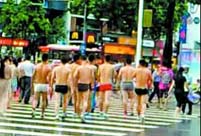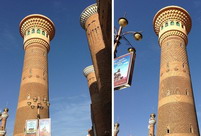 Air Forces arrive at designated area to join China-Russia drill
Air Forces arrive at designated area to join China-Russia drill
 High temperature hits Shanghai
High temperature hits Shanghai
 Old town Dali hosts int'l photography exhibition
Old town Dali hosts int'l photography exhibition
 Death toll rises to 29 in rain-related accidents across Pakistan
Death toll rises to 29 in rain-related accidents across Pakistan
 Baby returned to parents after allegedly being trafficked
Baby returned to parents after allegedly being trafficked
 Nutrica recalls Karicare infant formula in New Zealand
Nutrica recalls Karicare infant formula in New Zealand
 Sexy models in CFGP race
Sexy models in CFGP race
 Child labor still remains rampant in war-hit Afghanistan
Child labor still remains rampant in war-hit Afghanistan
 Sun Yang the star of last day at World Swimming Championships
Sun Yang the star of last day at World Swimming Championships
 |
| Nanjing (file photo) |
The Chinese character jing, meaning “capital city,” is now used in the names of only two cities in China: one is Beijing, today’s capital city, and the other one is Nanjing, the capital of Jiangsu Province in the south. Other ancient capitals such as Xi’an and Luoyang are no longer called jing because of historic changes. (Nanjing is literally “southern capital,” while Beijing is “northern capital.”)
As the only other city honored with jing in its name, Nanjing has a long and prosperous history as China’s onetime capital city and a flourishing cultural heritage.
During the Three Kingdoms (220-280), Sun Quan of the Wu Kingdom relocated his capital to Jianye, today’s Nanjing, in AD 229. Since then, the city has always been at least an economic and cultural center for southern China.
After the Three Kingdoms, several dynasties such as Jin (265-420), Southern Dynasty (420-589), Ming (1368-1644) — before it relocated the capital to Beijing — and the Republic of China (1912-49) chose the city on the Yangtze River to be the political center.
While Nanjing lost its spot as the most important city in China, economic and industrial development has changed it into a modern city. With the Second Asian Youth Games being held in the city this month, starting on August 16, many visitors will get a chance to see its modern stadium and infrastructure. However, historic sites in Nanjing and their cultural influence still remain a great attraction of this ancient city.
 |
 Air Forces arrive at designated area to join China-Russia drill
Air Forces arrive at designated area to join China-Russia drill  Hospital comes to aid of tragic family of ‘Chinese Cabbage Dad’
Hospital comes to aid of tragic family of ‘Chinese Cabbage Dad’ Czech artist performs bubble show at Hong Kong mall
Czech artist performs bubble show at Hong Kong mall  Italian Supreme Court confirms Berlusconi's jail verdict
Italian Supreme Court confirms Berlusconi's jail verdict Run naked as punishment for missing sales target
Run naked as punishment for missing sales target International Grand Bazzar in Urumchi,Xinjiang
International Grand Bazzar in Urumchi,Xinjiang  Chinese troops of "Peace Mission - 2013" arrive at exercise area
Chinese troops of "Peace Mission - 2013" arrive at exercise area Pakistan's rain-triggered accidents claim 29 lives: media
Pakistan's rain-triggered accidents claim 29 lives: media Anti-hijacking drill held on train in Wuhan
Anti-hijacking drill held on train in Wuhan Top 10 most dangerous jobs in the world
Top 10 most dangerous jobs in the world Zhang Ziyi graces Femina magazine
Zhang Ziyi graces Femina magazine Breathtaking images of extreme sports
Breathtaking images of extreme sportsDay|Week|Month